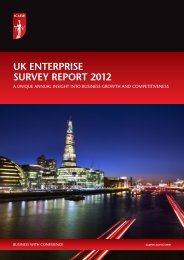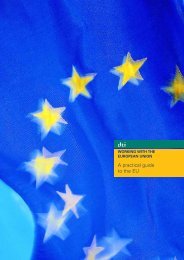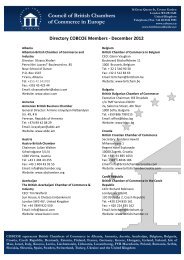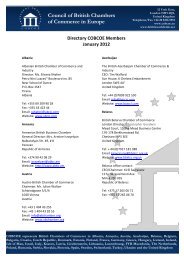Free Movement of Goods - Gov.uk
Free Movement of Goods - Gov.uk
Free Movement of Goods - Gov.uk
Create successful ePaper yourself
Turn your PDF publications into a flip-book with our unique Google optimized e-Paper software.
established the Union for the Protection <strong>of</strong> New Varieties <strong>of</strong> Plants (UPOV),based in Geneva.Patent law remains largely defined through national law and some internationaltreaties such as the European Patent Convention (EPC). However, certain rulesregarding biotechnological patents in Member States are harmonised through EUlegislation. EU legislation also provides for a system <strong>of</strong> national SupplementaryProtection Certificates, which grant an additional term <strong>of</strong> protection, after anunderlying patent has expired, to specific medicinal or agrochemical productswhich have obtained a marketing authorisation in the EU.Recently EU Regulations providing for a unitary patent have been adopted underenhanced cooperation. (1) Implementation <strong>of</strong> the system depends on theestablishment <strong>of</strong> a unified court under an international agreement. Unitarypatents will be delivered by the European Patent Office (EPO) which is not an EUorganisation but was set up under the EPC in the 1970s. It currently grantspatents for 38 countries.Currently individuals or businesses seeking to protect their inventions acrossEurope can either apply separately to each national patent <strong>of</strong>fice for a nationalpatent or they can apply to the European Patent Office (EPO) for a “bundle” <strong>of</strong>national patents; one for each country specified. The process is typically subject tocostly translation provisions and, in some countries, additional validation chargeswhich apply before the EPO granted patent can take effect.An EPO bundle <strong>of</strong> patents (for the same invention) does not necessarily <strong>of</strong>feruniform protection in each state, as different national rules apply. Thus, obtainingpatent protection across Europe is not only costly (compared with, for example, theUS), but the protection provided is not uniform, and enforcement must beseparately initiated in each country.The Unified Patent Court (UPC) Agreement is part <strong>of</strong> a package <strong>of</strong> measuresdesigned to establish and enforce unitary patent protection within Europe. Theother measures include two EU regulations which establish the unitary patent andthe associated translation arrangements. When the unitary patent system comesinto operation, alongside the existing mechanisms for patent protection, the unitarypatent will be granted by the EPO and the patentee will be able to enforce hispatent through the unified patent court rather than through separate national courts.(1) Enhanced cooperation allows those countries <strong>of</strong> the Union that wish to continue to work moreclosely together to do so, while respecting the legal framework <strong>of</strong> the Union. The Member Statesconcerned can thus move forward at different speeds and/or towards different goals.13








